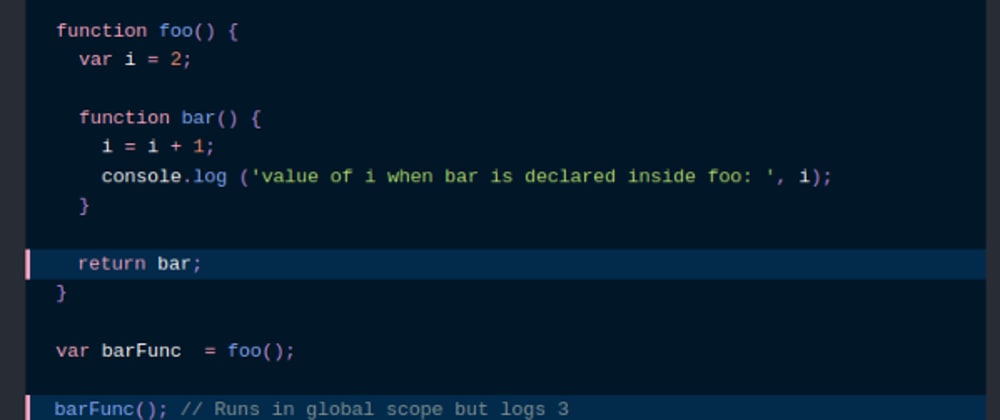In JavaScript and Scope II we saw that function scope is not determined by where a function is run. Instead, it is determined by where a function is declared.
var i = 10;
function foo() {
var i = 2;
function bar() {
i = i + 1;
console.log ('value of i when bar is declared inside foo: ', i);
}
bar();
}
foo(); // logs 3
But the example above doesn't fully illustrate lexical scope because the bar function is also run inside the foo function. Let's run the bar function outside of the foo function.
var i = 10;
function foo() {
var i = 2;
function bar() {
i = i + 1;
console.log ('value of i when bar is declared inside foo: ', i);
}
return bar;
}
var barFunc = foo();
barFunc(); // Runs in global scope but logs 3
In the code above, we no longer run bar inside of foo. Instead we return the inner function without running it. Then we run the function on the last line of code: it runs in the global scope. Most importantly it runs after foo is done running. But it does not use the global i variable. Instead it uses the i variable from the function that has already finished running!
The official name for what you just saw is closure. That's how simple closure is. All closure means is that even when a function is run outside of the scope it was declared in, it still uses the scope from where it was declared. In this case, inner function bar uses the scope of outer function foo. This is true even though foo has stopped running by the time we run bar.
This breaks our expectation that the scope of foo no longer exists when it stops running.







Top comments (3)
Thanks for the great series explaining how scopes work in JS. I'm just curious what programming languages don't follow functions lexical scope pattern, but organize "containers" for variables differently?
I haven't personally worked with languages that use dynamic scope instead of lexical scope, but I read that Perl allows dynamic scope. Dynamic scope is harder to reason about because it relies on how the program runs instead of how the program is written.
I will be happy to answer any questions about the article or about closures in general in the comments here.